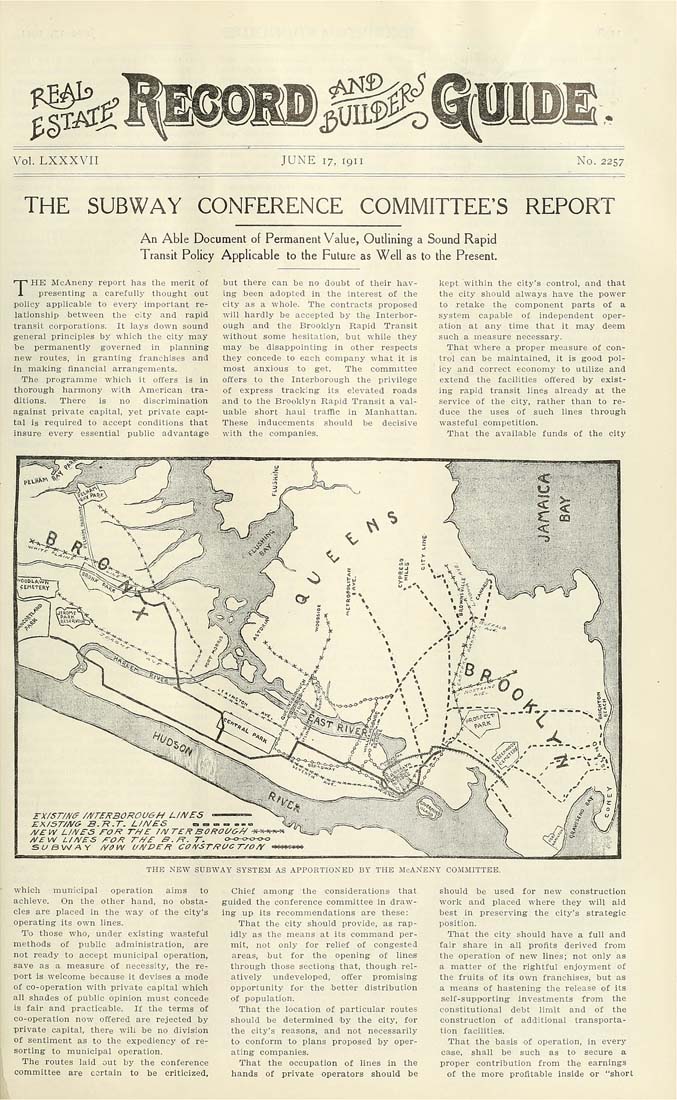Columbia University Libraries Digital Collections: The Real Estate Record
Use your browser's Print function to print these pages.
Real estate record and builders' guide: v. 87, no. 2257: June 17, 1911

Text version:
Please note: this text may be incomplete. For more information about this OCR, view About OCR text.
Vol. LXXXVII JUNE 17, 1911 No. 2257 THE SUBWAY CONFERENCE COMMITTEE'S REPORT An Able Document of Permanent Value, Outlining a Sound Rapid Transit Policy Applicable to the Future as Well as to the Present. THE McAneny report has the merit of presenting a carefully thought out policy applicable to evei-j' important re¬ lationship between the city and rapid transit corporations. It lays down sound general principles by which the city may be permanently governed in planning new routes, in granting franchises and in making financial arrangements. The programme which it offers is in thorough harmony -with Ameriean tra¬ ditions. There is no discrimination against private capital, yet private capi¬ tal is required to accept conditions that insure every essentia! public advantage but there can be 110 doubt of tlieir hav¬ ing been adopted in the interest of the city as a whole. The contracts proposed will hardly be accepted by the Interbor¬ ough and the Brooklyn Rapid Transit without some hesitation, but while they may be disappointing in other respects they concede to each company what it is most anxious to get. The committee offers to the Interborough the privilege of express tracking its elevated roads and to tlie Brooklyn Rapid Transit a val¬ uable short haul trafflc in iManhattan. These inducements should be decisive with the companies. kept 'within the city's control, and that the city should always have the power to retake the component parts of a system capable of independent oper¬ ation at any time that it may deem such a measure necessary. That where a proper measure of con¬ trol can be maintained, it is good pol¬ icy and correct economy to utilize and extend the facilities offered by exist¬ ing rapid transit lines already at the service of the city, rather than to re¬ duce the uses of such lines through wasteful competition. That the available funds of the city THE NEW SUBWAY SYSTEM AS APPORTIOXED BY THE McANENY COMMITTEE. which municipal operation aims to achieve. On the other hand, no obsta¬ cles are placed in the way of the city's operating its own lines. To those who, under existing wasteful methods of public administration, are not ready to accept municipal operation, save as a measure of necessity, the re¬ port is welcome because it devises a mode of co-operation with private capital which all shades of public opinion must concede is fair and practicable. If the terms of co-operation now offered are rejected by private capital, there wili be no division of sentiment as to the expediency of re¬ sorting to municipal operation. Tlie routes laid out by the conference committee are certain to be criticized. Ciiief among the considerations that guided the conference committee in draw¬ ing up its recommendations are these: That the city should provide, as rap¬ idly as the means at its command per¬ mit, not only for relief of congested areas, but for the opening of lines through those sections that, though rel¬ atively imdeveloped, offer promising opportunity for the better distribution of population. That the location of particular routes should be determined by the city, for tlie city's reasons, and not necessarily to conform to plans proposed by oper¬ ating companies. That the occupation of lines in the hands of private operators should be should be used for new construction work and placed where they will aid best in preserving the city's strategic position. That the city should have a full and fair share in ali profits derived from the operation of new lines; not only aa a matter of the rightful enjoyment of the fruits of its own franchises, but as a means of hastening the release of Its self-supporting investments from, the constitutional debt limit and of the construction of additional transporta¬ tion facilities. That the basis of operation, in every case, shall be such as to secure a proper contribution from the earnings of the more profitable inside or "short